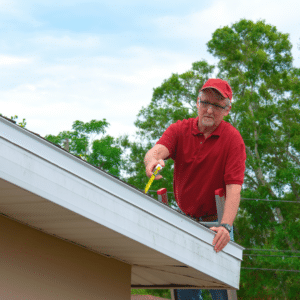Understanding the importance of roof inspection frequency is essential for homeowners looking to safeguard their homes and investments. With the right insights, you can ensure that your roof remains in top-notch condition, preventing costly repairs and ensuring peace of mind.
To maintain the ideal roof inspection frequency, follow these key tips. First, prioritize annual inspections to detect issues early and avoid costly repairs. Second, conduct prompt post-storm inspections to address hidden damage, especially after severe weather. Third, schedule expertise of professional inspections for thorough evaluations. Fourth, enhance your roof’s longevity with regular maintenance practices that save you money in the long run. Lastly, ensure the best care for your home by choosing the right roof inspector, one who is qualified and reputable.
Why Roof Inspection Frequency Matters
Your roof, often an unsung hero, shields your home from the elements day in and day out. Neglecting its care can result in a cascade of problems, from minor leaks to significant structural damage. This is precisely why being vigilant about your roof inspection frequency is of utmost importance. Here’s why keeping a watchful eye on your roof is crucial:
- Safeguarding Your Home Investment: Your home is one of life’s most substantial investments. Regular roof inspections are a protective measure, ensuring your roof remains in top-notch condition, safeguarding this vital investment.
- Avoiding Costly Repairs: Neglecting inspections can transform minor issues into major headaches, leading to expensive repairs down the road. Catching problems early is a cost-effective solution.
- Ensuring Peace of Mind: A well-maintained roof brings peace of mind. You won’t need to fret about leaks during a rainstorm or the weight of heavy snowfall, knowing your roof is in excellent condition.
Tips to Maintain the Ideal Roof Inspection Frequency
Annual Inspections Are Key
The changing seasons can take a toll on your roof, subjecting it to a range of weather fluctuations. To combat this, experts recommend annual inspections, ideally scheduled during the spring or fall. These seasonal time frames provide an optimal window for professionals to assess any damage that may have occurred due to shifting weather conditions.
Catching issues early is where the true power of annual inspections lies. This proactive approach ensures that even minor problems can be addressed promptly, preventing them from snowballing into more significant and costly issues down the road. So, by incorporating annual roof inspections into your maintenance routine, you can rest assured that your home’s protective shield remains strong year-round.
Prompt Post-Storm Inspections
When safeguarding your roof against the aftermath of severe weather events, such as storms or hail, our second expert tip is to prioritize prompt post-storm inspections.
Severe weather can unleash hidden damage that often remains imperceptible from ground level. This is where timely post-storm inspections prove invaluable. By promptly assessing your roof’s condition after such events, experts can uncover these concealed issues before they have a chance to escalate into more severe and costly problems.
Prompt post-storm inspections are not just a precaution; they are a proactive practice that can help you maintain your roof’s structural integrity. This approach ensures that any storm-related damage is identified and addressed promptly, saving you from potential leaks and extensive repairs. By incorporating this practice into your roof maintenance routine, you can enjoy peace of mind knowing that your roof is ready to weather any storm that comes its way.
The Role of Professional Inspections
While DIY inspections have their place, when it comes to the critical aspect of roof inspection frequency, the trained eye of a professional roofing inspector plays an irreplaceable role. Here’s why their expertise is invaluable:
Professionals possess a wealth of specialized tools and an in-depth understanding of roofing systems. These resources empower them to assess your roof comprehensively. Their equipment allows for a thorough evaluation, which may include infrared technology to detect hidden moisture or structural issues that might otherwise escape detection.
One of the primary advantages of professional inspections is their ability to uncover hidden issues. These are problems that might easily go unnoticed during a DIY inspection. By identifying and addressing these concealed concerns, professional inspectors help you prevent unexpected and costly repairs in the future, ultimately safeguarding both your home and your budget.
Extending Roof Lifespan
When it comes to the essential topic of roof inspection frequency, remember that maintaining your roof isn’t solely about fixing problems as they arise; it’s also about extending its overall lifespan.
Regular maintenance, guided by routine inspections, can significantly extend the lifespan of your roof. By addressing potential issues promptly, you can prevent them from escalating into more significant problems that may compromise the structural integrity of your roof. This proactive stance ensures that your roof remains robust and resilient against the elements.
Beyond enhancing durability, addressing issues early brings substantial cost savings. Minor repairs and maintenance are typically far less expensive than major roof overhauls. Embracing a preventive mindset and investing in regular inspections and maintenance can not only protect your home but also ensure that your roof lasts for many years, offering long-term value and peace of mind.
Choosing the Right Roof Inspector
In maintaining the recommended roof inspection frequency, a crucial step is choosing the right professional for the task. Here’s a helpful guide to assist you in making a well-informed decision:
The first and foremost criterion in your search for a roof inspector is to find someone who is both qualified and reputable. Seek out a licensed and insured roofing professional with a track record of experience in the field. These qualifications are essential as they ensure that the inspector meets industry standards and regulations. Furthermore, consider the reputation of potential inspectors. An experienced and well-regarded professional is more likely to provide thorough and accurate assessments of your roof’s condition, assuring you of the best possible service.
To evaluate the suitability of potential inspectors, don’t hesitate to ask pertinent questions. Inquire about their experience, including the number of years they’ve spent in the industry and the scope of their previous projects. Request references from past clients to gauge their satisfaction levels. By delving into these details, you can make a well-informed decision when choosing a roof inspector. This careful selection ensures that your home receives the highest level of care, which is essential in maintaining the integrity of your roof and adhering to the recommended roof inspection frequency.
Is it necessary to inspect a new roof as frequently as an older one?
Yes, even new roofs require regular inspections. While new roofs generally have fewer issues than older ones, they are not exempt from potential problems. Seasonal changes, severe weather events, and other factors can impact the condition of a new roof. By scheduling regular inspections, you can identify and address any issues early, ensuring the longevity and performance of your new roof.
In the world of homeownership, few tasks are as vital as maintaining your roof. Roof inspection frequency isn’t just a suggestion; it’s a cornerstone of responsible ownership. Ensure the safety and longevity of your home by scheduling a professional roof inspection with Just Roofs and Gutters.





